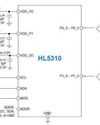
A bolt of lightning flashes across the sky and scientists marvel at diffusionlimited aggregation, a process in which random moving particles join to form static clusters. Three Cornell University students, Angela, Nathaniel and William, use an RP2040 and an inertial measurement unit to build a cyclic DLA simulator to tap into technology's ability to shed insight on natural processes like the formation of lightning.
The formation of snowflakes, the growth of crystals, and the path taken by lightning are all examples of natural phenomena can be modeled by diffusion limited aggregation (DLA), the process by which particles undergo a random walk and cluster together. Inspired by technology's ability to help us better understand natural processes, we built an interactive, diffusion-limited aggregation simulator as our final project for Cornell University's Digital System Design using Microcontrollers class. We augmented with motion controls that enabled users to manipulate the behavior of our simulated particles.
What Is DLA? Diffusion-limited aggregation models systems in which particle transport occurs primarily through diffusion, and particles tend to cluster around a pre-existing aggregate. DLA can model systems such as dielectric discharge, mineral aggregation, and even snowflake formation, an example of which is shown on a frosty window in Figure 1.
DLA models diffusion by simulating Brownian motion of particles. In a given time step, particles move by an amount sampled from a random normal distribution. The equation for the probability distribution of a normal distribution is shown below, where depends on the time step and simulation parameters. The 0 in the exponent expresses the notion that a particle is equally likely to go in one direction as it is the other.
Esta historia es de la edición November 2024 de Circuit Cellar.
Comience su prueba gratuita de Magzter GOLD de 7 días para acceder a miles de historias premium seleccionadas y a más de 9,000 revistas y periódicos.
Ya eres suscriptor ? Conectar
Esta historia es de la edición November 2024 de Circuit Cellar.
Comience su prueba gratuita de Magzter GOLD de 7 días para acceder a miles de historias premium seleccionadas y a más de 9,000 revistas y periódicos.
Ya eres suscriptor? Conectar

Renesas New RA8 Entry-Line MCU Groups Brings High Performance of Arm Cortex-M85 Processor to Cost-Sensitive Applications with Market-Leading CoreMark Performance
Renesas Electronics Corp., a premier supplier of advanced semiconductor solutions, introduced the RA8E1 and RA8E2 microcontroller (MCU) groups, extending the industry's most powerful series of MCUs.

Same Sky Expands AMT Absolute Encoder Line to Support Larger Shaft Sizes
Same Sky's Motion & Control Group announced the addition of a new series to its innovative AMT absolute encoder family designed to support larger motor shaft sizes from 9mm to 15.875mm (5/8 inch).

XP Power Launches New Series of Low-Profile, Baseplate-Cooled DC-DC Brick Converters
The RDF150 and RDF200 series are the latest additions to the RDF series of low-profile, baseplate-cooled, ultra-wide input DC-DC brick converters, which is already available in power outputs of 25W and 50W.

HMI Introduces Ultra-Low Voltage 12-bit GPIO Expander with Interrupt Output
HMI, a leading provider of advanced analog and power management technologies, announced the launch of its HL5310, an innovative ultra-low voltage 12-bit GPIO expander featuring interrupt output.

The Future of Embedded Chip Design Navigating the Chip Creation Space
Custom Silicon at Lower Cost, Reduced Development Time

The Long and Winding Road
From Maxim's RS-232 to WeMos ESP32: So Much to Do, So Little Time

Start to Finish Driving LCDs
Lumex Display with Microchip Driver for a TI MCU

Easing the Path for App Releases
Managed Development of React Native with Expo

Datasheet: Tiny Embedded Boards
Deliver Power, Performance, and Versatility in Meager Square Millimeters

Harvesting Ambient Energy
Hybrid Power Sources Cut IoT Battery Dependency